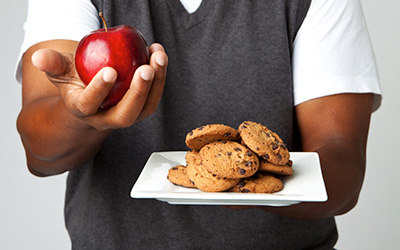



Food and water are two of the necessities of life. They’re also a big part of how people connect with family and friends, and eating can be a literal feast for the senses.
Most students eat when they’re physically hungry. Many, however, eat in response to their emotions: When they feel stressed, anxious, or bored, they reach for food. Or maybe they eat as a reward for completing a project or reaching a personal goal. How people interact with food can also be related to body image, taking control when life feels chaotic, or past experiences. If you find that food is related to your emotions, you’re not alone, and there are simple ways to stop the cycle.
In a recent Student Health 101 survey, nearly two-thirds of students said they occasionally eat when they’re not hungry, meaning they eat because of what they feel. Emotional and physical hunger, though they may appear the same, are quite different.
Emotional eating can come on suddenly and feel overwhelming. You might crave a specific food that provides an immediate rush of energy, or comfort. Cortisol, the hormone associated with stress, can trigger cravings for salty, sweet, and fatty foods. The instant gratification these foods provide can be intoxicating.
Maggie L., a sophomore at Saint Mary’s College of California in Moraga, knows this experience well. “I’m a stress eater, and usually start craving sugar,” she explains. “Sometimes I eat a lot before I realize I’ve done it.”
Maria Larkin, a registered dietitian and nutrition counselor with a specialization in eating disorders at the University of New Hampshire in Durham, believes that students who emotionally eat use food as a way to soothe themselves in response to difficult emotions, stress, or boredom. She suggests, “Emotional eating can be a way to stuff feelings, a way to numb out.”
Josh M.*, a senior at Texas A&M University in College Station, says he eats as a way to comfort himself.

Emotional eating begins with feeling overwhelmed by emotions. Although it might be uncomfortable, honestly expressing sadness, anger, disappointment, or frustration is healthy. Once acknowledged, these feelings will often subside. Stuffing them down-under food, alcohol or other drugs, or other disguises-will only make them fester and grow.
Becoming aware of moment-to-moment emotional experiences can assist you in better recognizing how you feel and with making mindful decisions about how you cope.
Rochelle L’Italien, a registered dietitian with dining services at the University of New Hampshire, suggests that students check in with themselves before eating. She says, “Take a moment to pause. Then ask if you’re actually hungry at this moment.” Kate B., a junior at Winona State University in Minnesota, notes, “This works for me. Most of the time I end up filling my water bottle because I’m really not hungry.”
Mindfulness, like any new skill, can be learned-and takes practice. Amanda C., a senior at the University of New Hampshire, says, “I think about whether I’m actually hungry or not. If I’m not, I go for a run or get some other kind of exercise. This usually helps to relieve some stress.”
Here are more ways to make mindful decisions about eating:
Some students feel guilty or ashamed after eating, especially when it’s for emotional reasons. Talking about these feelings and how they affect eating patterns can be difficult. But using food to cope with life’s stressors is more common than you might think.
While many are familiar with anorexia, bulimia, and binge eating, there are many other ways in which people might have an unhealthy relationship with food. If you or someone you know has questions about eating patterns, nutrition, and food, there is help available.
Food is one of the great pleasures of life. By developing a healthy, mindful relationship with it, you’ll be taking care of both your body and mind.
* Name changed for privacy.
Peter is a wellness educator and counselor at the University of New Hampshire.
Emotional and physical hunger can feel very similar. The next time you feel hungry, look for these signals to help you distinguish between whether you are emotionally or physically hungry.
Emotional Hunger is... |
Physical Hunger is... |
Sudden. A thought about food = feeling starved. |
Gradual. The stomach rumbles, then growls, giving you progressive cues that it’s time to eat. |
Craving a specific food. Usually comfort foods like chocolate, pasta, or a burger. No substitute will do. |
Interested in a variety of foods. You may have favorites, but will be open to alternative choices. |
“Above the neck.” Food cravings begin in the mouth and the mind, rather than in the stomach. |
“Below the neck.” The need for food is felt in the stomach. |
Urgent. You must eat now to instantly ease emotional pain. |
Patient. You’ll be able to wait a little while before eating. |
Connected to an upsetting emotion. The need to eat is linked with an emotional reaction. |
Based on physical need. It’s been 4-5 hours since you last had food. It’s time. |
Automatic. The eating is absent-minded. |
Mindful. You’re aware of the food you’re eating, and make conscious food choices. |
Not aware of fullness. More food will be consumed, even when the stomach is satisfied. |
Aware of fullness. Your body knows when you’re fueled and nourished. |
Associated with guilt. It’s a paradox, since emotional eating starts because you want to feel better. |
Guiltless. Eating is necessary to keep your body and mind healthy, and you feel good about taking care of yourself. |
You may be if you:
If you can identify with one or more of these, take some time to think about your eating habits. Speaking with a counselor or trusted friend can help you sort out your relationship with food.
Online body image and eating disorder screening tool
Here are more ways to enhance mindfulness when eating:
Many students have questions about nutrition, meal planning, and developing a healthy relationship with food. If you or someone you know wants to talk about his or her eating habits, there are many resources available. Here are some to try:




